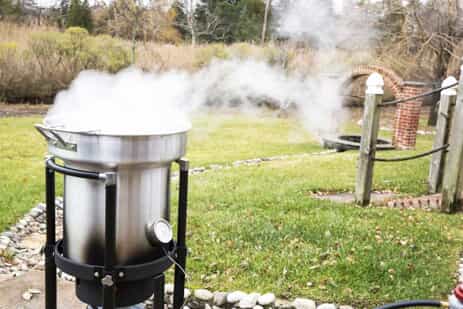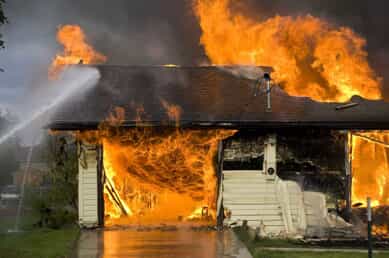Don’t Go from Fryers to Fires this Thanksgiving
More than $15 million in property damage is caused by deep fryer fires each year. We don’t want your home to become a part of that statistic. Originating in the South, the deep-fried turkey has become a new family tradition nationwide, with more families giving the technique a try each year. First-time fryers and accomplished chefs alike should keep in mind that deep-frying a turkey is much more dangerous than sticking one in the oven. Still determined to try? Here are some tips on turkey fryer safety.
Outdoor Turkey Fryers Are Inherently Dangerous
There’s a reason turkey fryers aren’t certified by Underwriters Laboratories. You’ve probably seen the UL’s logo on many items you own, but gas-fueled fryers won’t get their seal of safety approval. That’s because there’s no safe way to construct a fryer for a large item like a turkey. When in use, these specialized appliances present a variety of dangers, including:

- Spillage: A fryer may tip over or, if too much oil is used, overflow. The open flame below the frying pot is a fire hazard on its own. With the addition of cooking oil, a cooking flame turns into a raging inferno.
- Overheating: A grill of this type does not come with temperature controls, so it may heat your frying oil to dangerous levels. Different types of oil have different smoke points, ranging from 225° F (flaxseed oil) to 400° F (vegetable oil) and 440° F (corn oil) to 570° F (avocado oil). The closer they get to these temperatures, the more likely they are to catch fire. When deep-frying a turkey, pay careful attention to the oil temperature to avoid an over-done bird.
- Burns: The handles and lid on a turkey fryer heat up with the oil inside and touching them can cause serious burns in an instant. You’ll also need to be careful of oil spatters when adding or adjusting the turkey. Cover exposed skin and wear protective cooking gear to lessen the risk of accidentally cooking yourself.
- Precipitation: No one can account for holiday weather, and your fryer is vulnerable to precipitation. The high temperatures you need to cook a turkey will convert water or ice to steam in an instant, giving oil a high-power propulsion out of the fryer. Rain isn’t usually known for starting fires, but in this case, it just might.
Set Yourself Up for Safety
Knowing the specific dangers associated with deep frying your turkey can point you toward ways to mitigate the risk. When you’re planning your cookout, take your time to make sure you have a safe setup.
- Use Your Fryer Outdoors: You may be tempted to work in the garage, especially if the weather is bad but, despite the concrete floor, your garage is highly flammable.
- Set Up on a Flat Surface: To decrease the risk of your fryer tipping over, make sure the ground beneath it is level and free of debris.
- Stay Away from Flammable Items: Anything that has wood or fabric is a high fire risk around a superheated fryer. Your outdoor kitchen should be set up on stone or dirt and should be at least ten feet away from your house or shed, trees, or outdoor furniture. Keep the propane tank in a stable location as far away from the flames as you can.
- Get a Fire Extinguisher: Water won’t put out a grease fire—it will make it worse. Keep a fire extinguisher on hand, but not too close to where you’re cooking. A big flare-up can make the area around the fryer unreachable.
- Do A Trial Run with Cold Water: Frying requires precision, and you’ll need to measure your oil carefully to prevent undercooking or overflowing. Before you get started, put your turkey in your fryer’s pot and add water until you’ve covered the turkey, with an extra ½ inch on top. Take the turkey out and then measure the water precisely. Use this amount of oil (and no more) to prevent overspill.
Prep Your Turkey
As the central part of the mission, your turkey deserves a lot of attention. It needs it, too, because an improperly prepared turkey can literally explode.
- Thaw it Fully: You can choose to thaw your turkey in the fridge (one day for every four pounds) or by submerging it in cold water (one hour for every two pounds), but whatever you do, make sure you leave yourself enough time—and then some.
- Make Sure It’s Dry: Do this now for a juicy meal later. Any liquid, be it condensation from left-over ice or marinade, will vaporize when it hits the oil. The outside of your turkey should be perfectly dry before you take it to the fryer; in fact, it’s recommended you wipe it down after preparation and then give it a half hour to air dry before you start the frying process.
- Take Your Time: If the oil begins to spurt and splatter when you lower the turkey in, it can be tempting to drop the whole thing and get out of the way. However, that’s a great way to tip over your fryer or cause an overflow. Make sure the turkey won’t slip out of your grasp (or off the implements you’re using) and lower it slowly into the oil.
- Keep a Close Watch: Once the turkey’s in, your job isn’t over. Monitor the temperature of the oil with a thermometer or by watching for smoke and turn the gas off immediately if it begins to overheat.
Once your turkey is finished, turn off the flame before you remove it from the fryer to avoid any dangerous oil drips. Though your meal will be ready to eat soon, the oil will retain its heat for a long time, so keep kids and pets away from the fryer.
 Don’t Create House Fire Hazards During Your Holiday Celebrations
Don’t Create House Fire Hazards During Your Holiday Celebrations
No one wants their Thanksgiving ruined by a fire. Unfortunately, each year unexpected fires cause injury and damage during what should be a day of celebration with loved ones. We want you to stay safe—but if the worst happens, our team is here to help. At LaHatte Law, LLC, we have helped many clients with fire insurance claims after tragedy strikes at home. We can help you, too. Especially around the holidays, the last thing you need is more stress. Let us handle the difficulties of insurance negotiations so you can take care of everything else you need to do.
If your claim was underpaid or even denied, contact us online or call (504) 309-2996 for your free, no-obligation consultation.